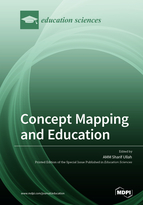Concept Mapping and Education
A special issue of Education Sciences (ISSN 2227-7102).
Deadline for manuscript submissions: closed (31 July 2019) | Viewed by 45266
Special Issue Editor
Interests: Industry 4.0; 3D Printing; sustainable product development; engineering education
Special Issues, Collections and Topics in MDPI journals
Special Issue Information
Dear Colleagues,
A concept map (or a network of some linguistic expressions) is a human-level representation of an issue. Concept-map-based educational activity ensures meaningful learning, and helps avoid, at the same time, rote learning. It also helps prepare contents for e-learning, as well as, measuring the learning outcomes at the course, program, and (even) institutional levels. Therefore, concept maps have extensively been used in schools, colleges, universities, and professional education. The objective of this Special Issue is to provide an outlet for the finding of our colleagues who are active in concept-map-based educational activities. In particular, this issue solicits manuscripts on (but not limited to) the following topics:
- Theoretical foundations of concept mapping
- Application of concept mapping in preparing e-learning contents
- Application of concept mapping in school education
- Application of concept mapping in higher education
- Application of concept mapping in professional education
- Concept mapping in active learning
- Concept mapping in problem-based learning
- Concept mapping in project-based learning
- Concept mapping in engineering education
- ICT-based concept mapping
- Concept-map-based distance learning
Dr. AMM Sharif Ullah
Guest Editor
Manuscript Submission Information
Manuscripts should be submitted online at www.mdpi.com by registering and logging in to this website. Once you are registered, click here to go to the submission form. Manuscripts can be submitted until the deadline. All submissions that pass pre-check are peer-reviewed. Accepted papers will be published continuously in the journal (as soon as accepted) and will be listed together on the special issue website. Research articles, review articles as well as short communications are invited. For planned papers, a title and short abstract (about 100 words) can be sent to the Editorial Office for announcement on this website.
Submitted manuscripts should not have been published previously, nor be under consideration for publication elsewhere (except conference proceedings papers). All manuscripts are thoroughly refereed through a double-blind peer-review process. A guide for authors and other relevant information for submission of manuscripts is available on the Instructions for Authors page. Education Sciences is an international peer-reviewed open access monthly journal published by MDPI.
Please visit the Instructions for Authors page before submitting a manuscript. The Article Processing Charge (APC) for publication in this open access journal is 1800 CHF (Swiss Francs). Submitted papers should be well formatted and use good English. Authors may use MDPI's English editing service prior to publication or during author revisions.
Keywords
- concept map
- educational science
- educational practice
- meaningful learning






